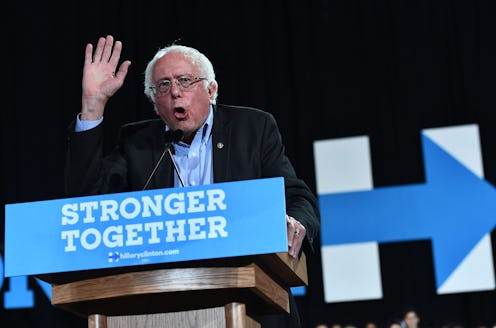Over the past several months, Vermont Sen. Bernie Sanders has become an indispensable surrogate for Hillary Clinton, campaigning nationwide on behalf of the candidate to whom he lost the Democratic party. But with the election over, you may be wondering: is Sanders still a Democrat? There's no easy answer.
Sanders' political affiliation has always been a bit nebulous. He has reiterated his commitment to the Democratic party throughout this election cycle, but he maintains that he will serve as an independent in the Senate. ("I was elected as an independent; I'll stay two more years as an independent," he told the Wall Street Journal in July.)
In February, PolitiFact delved into Sanders' complicated party history. Sanders first ran for office under Vermont's socialist Liberty Union Party, but he later served as mayor of Burlington, Vermont as an independent. He serves in Congress as an independent, too, though he has established a rapport with Democrats, and, in 2008, he attended his first Democratic National Convention.
So when this election is over, will Sanders still be a Democrat? Yes and no. He will be an independent in the Senate, because he was elected as one. But it seems that Sanders will continue to show support for the Democratic party and look for ways to make it more progressive. In July 2014, he spoke to USA Today about his affiliation with the Democratic party:
USA Today: Do you consider yourself a Democrat?
Sanders: Right now, I am a Democrat obviously, and we're going to fight as hard as we can to transform the Democratic party. So that's where I am right now. USA Today: Right now?
Sanders: No. It's fair to say that's where I am and that's where I'll stay.
What's not in doubt is that Sanders will continue to promote the positions that he championed while he was running for Democratic presidential nominee. Sanders has made a name for being more of an issues candidate than a party candidate. His progressive campaign for the presidency forced Hillary Clinton to move farther left on certain issues, including Social Security reform, raising the minimum wage, and working to stop climate change. If his desire is to champion change on issues like these, then working to make the Democratic party more progressive may more likely be the best way to do so.
